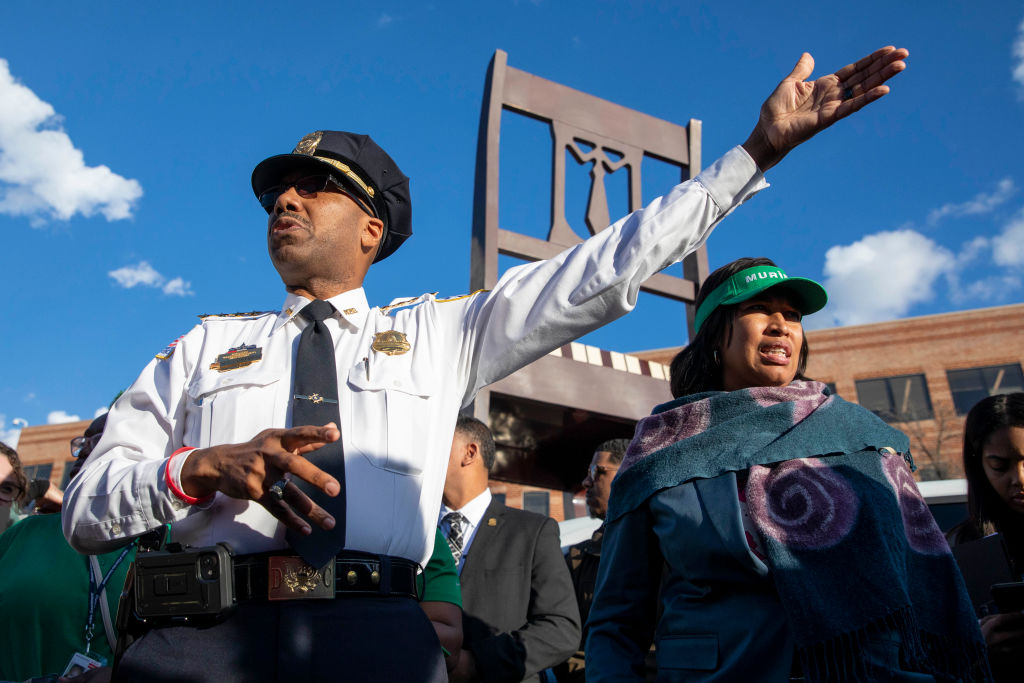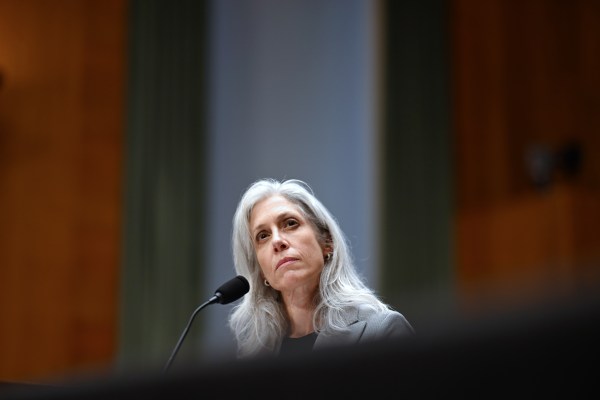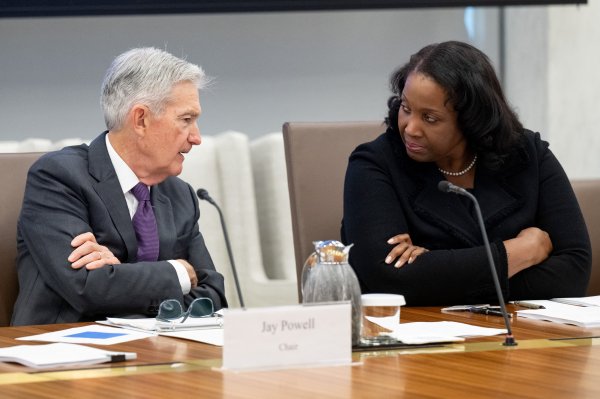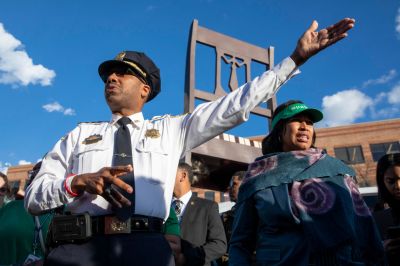Happy Monday! Toblerone chocolate bars will no longer feature the iconic Matterhorn mountain peak on their packaging because the candy’s manufacturer is moving some production from Switzerland to Slovakia. Under the 2017 Swissness Act, national symbols are reserved for products that meet various “Swissness” criteria.
Quick Hits: Today’s Top Stories
- The Pentagon announced a new $400 million security assistance package for Ukraine on Friday, tapping into previously approved congressional aid to send Ukraine additional High Mobility Artillery Rocket Systems (HIMARS) ammo, additional artillery rounds, Armored Vehicle Launched Bridges, demolitions munitions, and other arms and equipment.
- Dr. Kevin O’Connor, President Joe Biden’s physician, disclosed Friday the skin lesion removed from Biden’s chest during a routine physical last month was cancerous, but added that all cancerous tissue was successfully removed and no further treatment is required.
- The Commerce Department’s Bureau of Industry and Security announced Thursday it was adding 28 Chinese firms and individuals to its Entity List, prohibiting American firms from doing business with them unless granted a specific waiver. Agency officials said the restrictions targeted entities supporting Chinese military modernization and facilitating human rights abuses in China and Burma.
- The head of the International Atomic Energy Agency (IAEA), Rafael Grossi, visited Iran over the weekend to engage in talks over the country’s apparent enrichment of uranium to near-weapons grade. Upon his return, Grossi refuted claims by Iran’s nuclear chief that the “ambiguities have been resolved,” saying there will be more meetings soon to definitively determine whether the enrichment was accidental, as Iran claims, or purposeful. Iran did agree to grant the IAEA more access to its nuclear infrastructure, including monitoring cameras at some of its facilities.
- At the opening of the annual meeting of the National People’s Congress—China’s compliant legislature—the government announced an official growth target of 5 percent for 2023 and a 7.2 percent hike in defense spending. China missed its goal of 5.5 percent growth in 2022 by a sizable margin, but analysts predict 5 percent growth in 2023 is achievable, if not conservative. The 7.2 percent defense spending boost—which comes even as official language on Taiwan remains unchanged in favor of “peaceful reunification”—is the steepest such increase in four years.
- Tedros Adhanom Ghebreyesus, the Director-General of the World Health Organization, said Friday all potential explanations for the COVID-19 pandemic—including the lab leak theory—remain on the table, despite the institution’s previous assessment which found zoonotic transmission to be the most likely cause. Tedros emphasized the need for more transparency from China, where the pandemic began, while U.S. agencies remain divided over the virus’s origins.
- Larry Hogan, the former governor of Maryland, announced Sunday that, after exploring a bid, he will not seek the GOP nomination for president in 2024. “There are several competent Republican leaders who have the potential to step up and lead,” he wrote in a New York Times opinion piece. “But the stakes are too high for me to risk being part of another multicar pileup that could potentially help Mr. Trump recapture the nomination.”
D.C. Facing Congressional Oversight

Pop quiz: Which Democrat said the following?
The fact that more than half a million Americans live in the District of Columbia and are denied a single voting representative in Congress is clearly a historic wrong, and justice demands that it be addressed.
Trick question: It wasn’t a Democrat. It was Mike Pence, circa 2007.
Fast forward to 2023, and not only has D.C. not gained statehood or voting representation on Capitol Hill—despite decades of activism and hundreds of thousands of “end taxation without representation” license plates—but Congress is poised to exert its unique power over D.C. by voting to overturn a recent overhaul of the city’s criminal justice code. President Joe Biden stunned Washington last week by announcing he would not veto the Republican-led legislation, reversing his administration’s previous position on the bill.
The switcheroo ticked off a number of Biden’s allies and turbocharged perennial debates over D.C. statehood, demonstrating yet again the salience of rising crime as a political issue ahead of 2024. Democrats and Republicans are both struggling to balance criminal justice issues with effective policing and law enforcement amid a post-pandemic crime wave, but voters seem to prefer the GOP’s tougher stance right now.
Statehood advocates have long argued that with its population of 712,000—more than Vermont or Wyoming—and the highest per capita federal tax rate in the country, Washington, D.C., deserves congressional representation. Various proposals have come and gone over the decades, and statehood bills were introduced again this year but are unlikely to pass—the Republican House majority isn’t eager to give their Democrats colleagues anything resembling an edge. The city has gained some ground since its founding—the 23rd amendment allows residents to vote in presidential elections—yet the Home Rule Act still allows Congress 60 days to alter or override any law the D.C. Council passes.
The criminal code overhaul looks to be on the congressional chopping block. Sixteen years in the making and set to take effect in October 2025, it would expand the right to a jury trial to all those charged with misdemeanors that carry jail time. Opponents like Mayor Muriel Bowser say that would overtax D.C.’s courts, which already have judicial vacancies the president and Senate have failed to fill. The new code would also reduce maximum penalties and lower minimum penalties for high-profile crimes like burglary, robbery, and carjacking—the last of which is up 111 percent year-to-date this year over last. Proponents say the new sentencing rules would better match average sentences judges already hand down and more closely match penal codes already used by many states.
But it’s no surprise that lessening possible penalties has attracted attention—many a D.C. denizen has walked past a Honda resting on cinder blocks with its tires stolen, texted roommates about the latest mugging or carjacking just down the block, or biked by the scene of a shooting. “We’re experiencing more robberies and carjackings and people using guns, and I think the message of accountability for those crimes has to be abundantly clear,” Bowser said. She vetoed the new code in January, but the Council overrode her. She’s now in the awkward position of opposing Congress’ power to overturn D.C. laws but not fighting very hard to stop it this time—not that her opposition would make a difference. The House has already passed the measure 250-173 and the Senate looks poised to follow.
“The District of Columbia doesn’t belong to a handful of local politicians, it belongs to more than 330 million American citizens,” Senate Minority Leader Mitch McConnell declared last week. “Should we be softer on crime, like Democrats want, at the local, state, and federal levels? Or should we be tougher on crime, like Republicans and the American people want? That’s the debate.”
If that’s the debate, Democrats are in trouble—which could explain Biden’s effort to have his cake and eat it while announcing he won’t veto a congressional measure overturning the criminal code. “I support D.C. Statehood and home-rule,” he tweeted Thursday. “But I don’t support some of the changes D.C. Council put forward over the Mayor’s objections—such as lowering penalties for carjackings.”
Some Democrats were furious—not just at Biden’s reversal, but how it was handled. “If he was going to do it I wish he would’ve told us first, because this was a hard vote for the House members,” former Speaker Nancy Pelosi said Friday. Rep. Alexandria Ocasio-Cortez of New York—speaking for much of the Democratic caucus—was even more direct. “This ain’t it,” she said. “DC has a right to govern itself, like any other state or municipality. If the President supports DC statehood, he should govern like it.”
It’s tough to get a comprehensive picture of whether the post-COVID wave of crime—particularly homicides—is subsiding. The FBI’s 2021 report, released last October, showed a 1 percent year-over-year decrease in violent crime. That’s a step in the right direction but hardly an appreciable drop, and we have no idea if it’s even accurate—the bureau adopted a new reporting system last year and only got data from 63 percent of the nation’s police departments, with New York City and Los Angeles skipping out.
And reporting data from major cities paint a mixed picture, particularly on homicide. Overall, 38 percent of cities are reporting more murders so far this year from the same period last year, according to an analysis by AH Datalytics. But New York has posted a 17 percent drop in homicides from this period last year, while Los Angeles showed a 33 percent decrease. In Houston, homicides were up 55 percent in January 2023 from a year earlier, but overall crime had dropped 6 percent. Though Florida Gov. Ron DeSantis recently took time out of his busy schedule to criticize New York’s 2022 crime climb, year-to-date murders are up nearly 12 percent in Tampa, 12 percent in Jacksonville, and 10 percent in Miami.
So Biden may be right to worry: “Defund the police” has long dropped off campaign posters but still lingers in Democrats’ ballot box nightmares. The tide had already turned against the slogan by 2021—when Bruce Harrell became mayor of liberal Seattle while promising to add officers to the city’s police force—and warning signs for Democrats have only gathered in recent months. New York Republicans overperformed in November’s midterms thanks in part to a tough on crime message, and last week Chicago Mayor Lori Lightfoot—whose city’s crime rate is up 52 percent overall from this time last year—lost her reelection bid last week.
So what’s a president (almost certainly) running for reelection to do when his commitment to D.C. statehood conflicts with an electoral incentive to avoid being considered soft on crime? Send in the press secretary to push both lines. “The President has been very clear we need to do more to reduce crime,” press secretary Karine Jean-Pierre said Friday. And, she added, “Vetoing the bill headed to his desk now won’t make D.C. a state.”
Worth Your Time
- Will the Trump campaign’s efforts to slander his 2024 primary rivals as “Reagan Republicans” backfire? Noah Rothman thinks the strategy is risky. “Forcing Republican voters to interrogate and disown their nostalgia for Reagan could be a harder slog than Trump’s camp and his loudest backers on social media think,” he writes in National Review. “Paul Ryan-ism gets a bad rap because it is unpopular, and populists want nothing more than to be popular. But Ryan devoted his career to a noble idea—one that had supplanted the soft statism of the pre-Reagan GOP and swept aside the cosseting protectionism that kept Western Europe in shackles—and he sacrificed a lot in its pursuit. The populist Right has no such noble economic idea; it just wishes to seize power so it can put big government to its own ends. It is a testament to the populists’ political skill that they have convinced so many that their economic program represents a rare, welcome willingness to fight. But it doesn’t; it represents a capitulation to the Left.”
- A Brazilian man in tears after the death of Pelé. A girl’s soccer team under Taliban rule. Bear cubs making themselves at home on a North Carolina couple’s porch. All those scenes and more are among the finalists in this year’s Sony World Photography Awards. Check out the various collections here.
Presented Without Comment
Also Presented Without Comment
Also Also Presented Without Comment
Toeing the Company Line
- The Dispatch Monthly Mailbag (🔒) is back, and it’s Andrew’s turn in the hot seat. Do you have questions for him about covering campaigns, playing the guitar, or the Cubs-Cardinals rivalry within the newsroom? Members can drop them in the comments section here, and he’ll answer as many as he can in the coming weeks!
- In the newsletters: Haley reports on (🔒) bipartisan efforts to enact tech privacy protection legislation, Chris explains how (🔒) both Republicans and Democrats have botched the issues of crime and policing, Nick predicts the decline (🔒) of Fox News after the Dominion revelations, and Jonah breaks down the Chicago mayoral election. “Thanks to decades of entrenched incumbency, combined with the introduction of palpably stupid social engineering ideas, big city Democratic machines have forgotten what their actual jobs are,” he writes.
- On the podcasts: Jonah ruminates on cancel culture and both-sidesism, and Steve interviews journalists James B. Stewart and Rachel Abrams about their new book, Unscripted: The Epic Battle for a Media Empire.
- On the site over the weekend: Isaac Schorr weighs in on the first five episodes of Netflix’s You season four, Alec argues Cocaine Bear could become a cult classic, Peter C. Meilaender describes his trip to the Freud Museum in London, and Kevin bemoans the faulty incentive structure in modern journalism.
- On the site today: Chris reflects on the principled career of Bill Sammon, Harvest covers Wisconsin’s pivotal supreme court race, and Emanuele Ottolenghi explores what the docking of two Iranian warships in Brazil means for American regional hegemony.
Let Us Know
Did President Biden make the correct political decision in not vetoing the D.C. crime bill? Did he make the right policy decision? Are you concerned about the precedent the move sets?








Please note that we at The Dispatch hold ourselves, our work, and our commenters to a higher standard than other places on the internet. We welcome comments that foster genuine debate or discussion—including comments critical of us or our work—but responses that include ad hominem attacks on fellow Dispatch members or are intended to stoke fear and anger may be moderated.
With your membership, you only have the ability to comment on The Morning Dispatch articles. Consider upgrading to join the conversation everywhere.